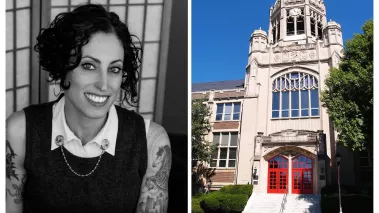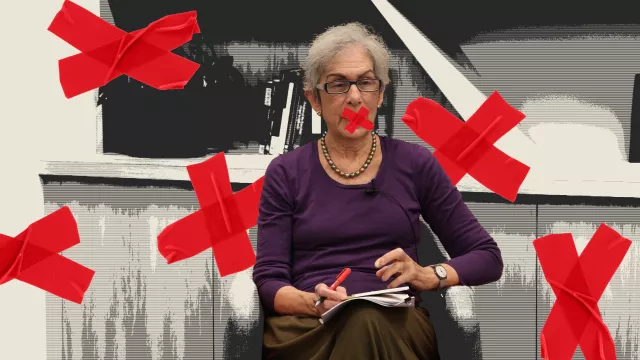Table of Contents
In major hit to tenure, Muhlenberg fires pro-Palestinian professor

Cynthia Farmer / Shutterstock.com
Anthropology professor Maura Finkelstein (left) was fired by Muhlenberg College, the third serious attack on tenured faculty this week.
For the first time since the October 7 terror attacks in Israel and subsequent war in Gaza, a tenured faculty member in the United States has been fired for pro-Palestinian advocacy. The firing of tenured anthropology professor Maura Finkelstein by Muhlenberg College, a private, Lutheran school in Allentown, Pennsylvania, marks the third serious attack on tenured faculty this week.
Finkelstein, unenviably, joins both Penn Law professor Amy Wax, who was dealt a major sanction for her in-class and extramural speech, and Joe Gow, fired today from his tenured faculty role at the University of Wisconsin at LaCrosse for making vegan-themed pornography with his wife in his spare time.
Finkelstein reportedly lost her job after an administrative investigation into her social media posts about the Israeli-Palestinian conflict. According to Inside Higher Ed, Finkelstein reposted an Instagram story from a Palestinian-American poet that stated, in part:
Do not cower to Zionists. Shame them. Do not welcome them in your spaces. Do not make them feel comfortable. Why should those genocide-loving fascists be treated any different than any other flat-out racist. Don’t normalize Zionism. Don’t normalize Zionists taking up space.
November reporting by the college’s student newspaper, the Muhlenberg Weekly, suggests Finkelstein has been a lightning rod for her pro-Palestinian advocacy since October 7.
Finkelstein sent a message to all Muhlenberg faculty members stating the events of October 7 could not be “mourned” without acknowledging that “Israel is a settler colonial state, Palestinians have been living under occupation since 1948, and Gaza is an open air prison.” She added that for “Palestinians in Gaza, Israel’s acts of revenge will likely result in absolute annihilation.”
On social media, according to the online petition, Finkelstein had also posted a photo of a fundraiser for the Israeli war effort with the caption, “Students raising money for genocide[.]” One of her posts also reportedly prompted an argument in the comments section with another member of the Muhlenberg community.
Universities must not violate tenure lightly, especially when the incidents in question involve political speech made off-campus on a matter of public concern.
On Oct. 29, Muhlenberg alumni started the online petition calling for the college to discipline Finkelstein for her online activism. The petition described her speech as “glorifying Hamas and vilifying Israel” and alleged that Finkelstein was exhibiting “classroom bias” and “targeted aggression” toward Jewish students.
While Finkelstein’s speech may be offensive to some, or even many, it is protected under Muhlenberg’s academic freedom promises. Muhlenberg itself clearly commits to academic freedom and free expression. It has publicly affirmed that commitment by pledging, “Freedom of expression and inquiry and the safety of our community are fundamental to the Muhlenberg liberal arts mission.” Other Muhlenberg policies describe that the institution “believes that freedom of expression and academic freedom are essential to its educational mission,” and that “academic freedom may directly challenge individual and group beliefs, values, and/or cultural norms, and grappling with new ideas is crucial to the development of complex thinkers and engaged citizens.”
But in the same breath, the college warns that when speech “demeans, denigrates, humiliates, or expresses hatred toward any particular person or class of persons,” it is no longer protected.
Muhlenberg can’t have it both ways. It wants to be known for protecting free speech and academic freedom — just not when doing so is controversial.
Universities must not violate tenure lightly, especially when the incidents in question involve political speech made off-campus on a matter of public concern. Free speech principles dictate that political speech warrants the greatest level of protection. The burden is on Muhlenberg to publicly demonstrate exactly what Finkelstein did to warrant such an extreme measure. The college’s silence so far suggests it can’t meet this high standard.

Amy Wax is academic freedom's canary in the coal mine
Penn's chilling decision to punish the controversial professor calls tenure protections at private universities into question
Universities typically revoke tenure only in cases of egregious faculty wrongdoing. Harvard University, for example, moved toward revoking tenure for a professor at its business school who was accused of serious data fraud. This was an unprecedented move for the university: The Harvard Crimson does not identify another case of Harvard revoking a professor’s tenure since the 1940s.
The closest parallel to a university revoking a professor’s tenure over speech about the Israeli-Palestinian conflict may be from a decade ago at the University of Illinois at Urbana Champaign. Professor Steve Salatia was set to join the university as a tenured faculty member, but his job offer was yanked just two weeks before he was supposed to start — coincidentally right when his public criticism of Israel was gaining attention online.
The university denied that it revoked the offer because of Salatia’s posts, but Salatia sued and got a big settlement. The lawsuit ended up costing UIC more than $2 million in legal fees, and Salaita received a $600,000 payout.
Finkelstein is not the first faculty member to come under fire in the last year for speech about the Israel-Hamas war. Unfortunately, examples of faculty members facing suspensions and investigations for speech outside the classroom abound. But she does appear to be the first one fired despite having the protection of tenure.
At the end of a week that saw two other high-profile, tenured professors punished, we should all be concerned for faculty rights across the nation.
Public college and university faculty who face a threat of sanction by their institution or have been punished for expressive activity — whether it’s instruction, scholarship, or speaking on issues of public concern — can submit matters for FLDF consideration. They can do so through FLDF’s dedicated 24-hour hotline at 254-500-FLDF (3533), or submit a case online.
Recent Articles
Get the latest free speech news and analysis from FIRE.

Can the government ban controversial public holiday displays?

The trouble with banning Fizz

FIRE's 2025 impact in court, on campus, and in our culture


